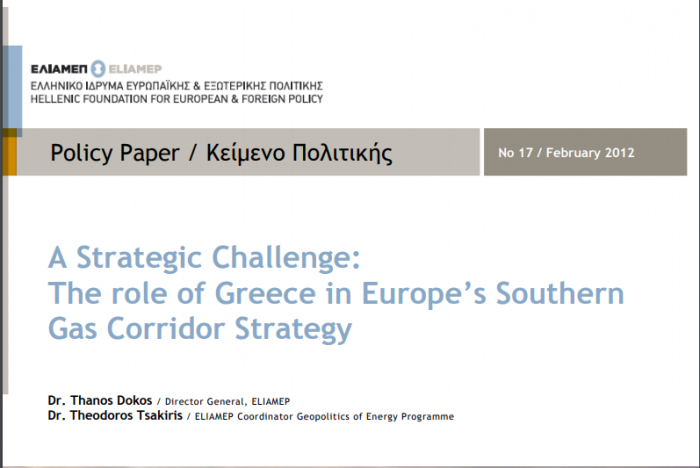The question of European energy security has brought attention to the strategic significance of Southeastern Europe as a transport hub of natural gas and a key region for European energy security. To meet increasing natural gas demand and reduce energy dependency on Russia, European authorities need to promote the realization of projects contributing to the diversification of natural gas supply, alongside improving Europe‟s relationship with Russia by diversifying its import routes, two targets which are not necessarily mutually exclusive.
The principal targets of this study are (a) to illustrate the major geopolitical parameters of the European Union‟s Southern Gas Corridor Strategy which aspires to diversify the Union‟s natural gas import sources while strengthening the political and economic independence of hydrocarbon-rich former Soviet States (b) to present the general framework and key strategic objectives of Greek foreign policy, and the role Greece‟s energy policies are expected to play and (c) to evaluate through a strategic lens Europe‟s options for the Southern Gas Corridor.
Europe‟s Southern Gas Corridor Strategy is founded on the necessity to maximize the imports of non-Russian gas via non-Russian controlled territory, so as to establish an additional route of supply diversification. Any meaningful discussion on the feasibility of the three remaining Southern Gas Corridor Strategy pipeline projects, namely Nabucco, BP‟s South East Europe Pipeline (SEEP) and Trans-Adriatic Pipeline (TAP) that vie for the transportation of (initially) Azeri gas to Europe via Turkey, requires an examination of the geopolitical environment which will –to a large extent- determine their eventual implementation.
The study analyzes the geopolitical rationale behind Europe‟s Southern Gas Corridor Strategy by focusing on the reasons which have led to the weakening of the rather “pharaonic” Nabucco pipeline project compared to its two smaller and more cost-efficient (even when taking into consideration the scaled-down version presented in the last few days by the Nabucco consortium) competitors TAP and ITGI. Understanding why Nabucco has lost significant ground is crucial for securing Greece‟s role in the Southern Gas Corridor. A special reference is also made to BP‟s SEEP project, a rather nebulous latecomer in the Shah Deniz-II race and the way its implementation may influence Greek policy and interests. The study then evaluates the likely impact of each project‟s implementation on Greece‟s foreign policy.
Read the paper here: A Strategic Challenge: The Role of Greece in Europe’s Southern Gas Corridor Strategy



